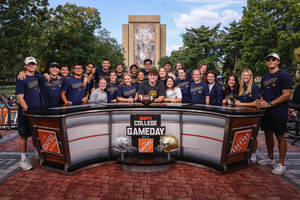 "
"
Each year, the university’s football program employs about 25 students as student equipment managers, more commonly referred to as football managers.
In order to become a manager, students must first attend tryouts during the spring semester. The football team is allowed to hold 15 on-field practices during the spring semester, per NCAA guidelines, so candidates for the manager position are divided and assigned to different practices. At the practices, the applicants shadow a current manager and then are evaluated for their work ethic. At a later date, managers are selected from the pool of applicants and asked to work during the following football season.
During the football season, football managers play vital — albeit varying — roles in both games and practices. Junior football manager Maria Go said, “In season, we usually report Monday through Thursday at 2:45.” She explained that many managers are assigned a position group and are tasked with setting up equipment, helping with drills and cleaning up when practice is finished, usually ending around 6 or 7 p.m.
Senior football manager Heather Roland played a different role at practices, having worked as the “practice DJ” during the 2023 football season. When asked what music she chooses at practices, Roland said, “I play literally everything. My [phone] number is in the locker room so [the players] will just send me songs.” Roland curated playlists for specific themes throughout the week, such as “Throwback Thursday” or “Almost Gameday.” Roland said that a large part of her job was to keep an eye on head coach Marcus Freeman. “He’ll do [hand] signs for the music, or request a song,” Roland said.
In addition to the roles they play at practices, the football managers are essential to the smooth operation of game days. Graduate student football manager Timmy Murray worked as a defensive signaler. On game days, he could be seen on the sideline making large gestures to signal play calls to the players on the field. Murray and the other signalers are tasked with creating the signals and then teaching them to the players. “It’s kind of a big game of charades,” he said. “We try to make a signal that resembles that word [that we were given by the coaches], and we record ourselves and then send that to the team.” During the game, the signalers wear headsets. “The coaches will say a series of words and then we’ll signal those signals attributed to specific words,” Murray said.
These are only a few of the many roles that football managers play in the operation of practices and games. “Every manager we have is crucial to the operation of our practices and games. There’ll be times for one reason or another — when a manager is sick, or when they’re busy with exams — that they’re not at practice, and practice just kinda feels a little more stressful and chaotic without them there,” Murray said.
Working as a football manager has provided many with the opportunity to engage with Notre Dame football despite not playing the sport. “I always have loved football. My brothers played growing up. I was a cheerleader, because I wasn’t allowed to play football, or else I would’ve,” said Roland.
Similarly, Murray said, “I always grew up a big Notre Dame football fan, but never actually played football in general. My mom wouldn’t allow me to play football growing up, and then my high school didn’t have it.” When Murray was in sixth grade, his brother was a senior at Notre Dame, and that was the year that Notre Dame went to the national championship. “Since then,” he said, “I was hooked on Notre Dame football.”
Working as a football manager gave Murray a unique experience with the program. “You have an on-the-field viewing of Notre Dame football, which is really cool. Not a lot of people can say they do that, let alone get paid to do it,” he said.
For others, working as a football manager goes beyond being a hobby and serves as an insight into a career in sports. Go said, “I wanted to see what a job in sports would look like, especially something so hands-on as being an equipment manager, so I thought I would try it out.”
No matter their reasons for becoming a football manager, there seems to be a consensus that the job comes with amazing opportunities and a strong community. Roland said, “My favorite part [of being a manager] is definitely the people … At this point we’re family.” The managers even spent Thanksgiving and Christmas together in 2023.
While the job certainly comes with a lot of hard work and is a major time commitment, the student equipment managers enjoy having a unique perspective of Notre Dame football. Go said, “There’s nothing like being on a sideline for the Notre Dame football games. Seeing the student section go crazy during ‘Here Come the Irish’ and ‘The Boys are Back’ and the band come out — there’s nothing like it.”